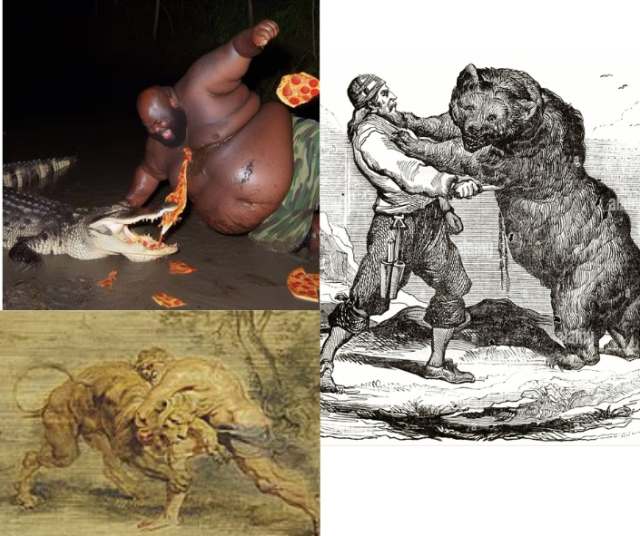Can we beat a wild animal in a fight?

The question of whether a human being could defeat a lion, a bear or a crocodile with his bare hands is a topic that has generated debate and speculation for centuries. These are some of the most formidable predators in the animal kingdom, equipped with powerful claws, sharp fangs, and impressive physical strength. In this article, we will explore the physical and tactical capabilities of both humans and these animals to determine if it would be possible for a human to defeat one of them in a hand-to-hand confrontation.
Anatomy and Abilities of Lions, Bears and Crocodiles.
To understand the dynamics of a possible confrontation between a human being and one of these predators, it is crucial to understand the strengths and weaknesses of each species.
Lion:
Lions are agile and powerful predators that can run at speeds of up to 50 miles per hour for short distances. They are armed with sharp claws and powerful fangs that allow them to tear the flesh of their prey with ease. Additionally, they possess outstanding strength in their jaws, allowing them to inflict lethal damage with a single bite.
Bear:
Bears are incredibly strong and resilient animals, capable of lifting considerably greater weights than humans. They have sharp claws and powerful teeth that can cause serious damage with just one hit. Additionally, bears have impressive stamina and are known for their ability to fight for long periods of time.
Crocodile:
Crocodiles are fearsome aquatic predators that can reach speeds of up to 20 miles per hour in the water. They are armed with extremely strong jaws and sharp teeth designed to catch and tear apart their prey. Additionally, crocodiles are stealthy and can stalk their prey without being detected.
Human Capacities and Survival Strategies.
Although humans may not have the same physical abilities as lions, bears or crocodiles, they possess certain advantages that could allow them to survive in a hand-to-hand confrontation.
Intelligence and Tactics:
One of the greatest strengths of human beings is their ability to think and plan strategies. Unlike animals, humans can use tactical tools and techniques to confront their opponents. For example, they might try to distract the animal, seek shelter, or even improvise weapons to defend themselves.
Resistance and Adaptability:
Although humans may not be as strong or fast as lions, bears or crocodiles, they have a remarkable capacity for resilience and adaptability. Humans can run long distances, withstand pain, and remain calm under pressure, allowing them to stay in the fight for long periods of time.
Knowledge and Experience:
Humans can also benefit from their knowledge of animal behavior and their ability to anticipate movements and reactions. Those with wildlife experience could recognize warning signs and take preventive measures to avoid a potentially dangerous confrontation.
Confrontation Scenarios and Probable Results.
Although it is difficult to predict with certainty the outcome of a confrontation between a human and one of these predators, it is possible to consider several scenarios and probable outcomes.
Lion:
In a direct confrontation, it is unlikely that a human being can defeat a lion barehanded. Lions are too fast, strong and deadly for the average human. However, if a human can stay calm and use smart tactics, such as evading the lion or seeking shelter in a high place, their chances of survival could increase.
Bear:
Bears are formidable animals with impressive strength and endurance. In a hand-to-hand confrontation, a human would have little chance of defeating a bear. However, if the human can stay calm and use smart tactics, such as playing dead or using improvised tools, they might have a small chance of survival.
Crocodile:
Crocodiles are deadly aquatic predators with powerful jaws and formidable strength. In a head-to-head confrontation, a human would have little chance of defeating a crocodile. However, if the human can stay calm and avoid being caught by the crocodile, he might have a small chance of escaping alive.
Specific Situations in which You Can Win the Fight:
In extreme and unlikely situations, there are scenarios where a human might have a small chance of winning a hand-to-hand confrontation against a lion, bear or crocodile without having to flee. These scenarios could involve a combination of factors such as cunning, improvisation, and luck. Next, we will explore some possibilities:
Lion:
Use improvised tools:
If a human has access to objects such as stones, sticks, or other blunt objects, they might try to use them to defend themselves against the lion. Hitting the lion in the nose, eyes, or paws with a blunt object could cause enough pain or distraction to allow the human to escape or find safe shelter.
Target vulnerable points:
If a human can remain calm in the middle of the confrontation, they could try to attack the lion's vulnerable points, such as the eyes, nose or throat. A precise hit on one of these critical points could temporarily incapacitate the lion and give the human a chance to escape.
Distraction strategy:
Some people have managed to survive encounters with lions by using distraction tactics, such as screaming loudly, making sudden movements, or throwing objects in different directions. This could disorient the lion enough to give the human an opportunity to escape or seek help.
Bear:
Play dead:
In some cases, bears may stop attacking if they perceive that their prey no longer poses a threat. By adopting a submissive position and avoiding eye contact, a human could trick the bear into leaving them alone. However, this strategy is not always effective and is highly dependent on the bear's behavior.
Attack vulnerable points:
If a human is in a hand-to-hand confrontation with a bear, it might try to attack vulnerable points such as the eyes, nose or ears. A well-aimed blow to one of these spots could cause enough pain for the bear to temporarily retreat.
Crocodile:
Aim at eyes or nose:
In a confrontation with a crocodile, a human might try to attack the animal's eyes or nose, as these are vulnerable points. If the human can avoid being caught by the crocodile's jaws, a well-aimed blow to one of these sensitive spots could disorient the crocodile enough to allow the human to escape.
Use self-defense techniques:
Some people with training in self-defense techniques may be able to use quick, precise movements to temporarily incapacitate the crocodile. These techniques could include hitting vital points on the crocodile's body or maneuvering to break free from its grasp.
Ultimately, the question of whether a human being could defeat a lion, bear, or crocodile barehanded is complex and multifaceted. Although humans have certain advantages, such as their intelligence and planning abilities, they also face significant challenges due to the natural strength and abilities of these predators.
The best strategy to avoid a dangerous confrontation with these animals is to take appropriate precautions and respect their territory and natural behavior. Wildlife education and survival skills training can be helpful in avoiding potentially dangerous encounters and ensuring the safety of both humans and animals. Ultimately, peaceful coexistence between humans and wild animals is critical to wildlife preservation and environmental protection.
ARTICLES

How to get over a breakup?
Through self-care, reflection, and openness to new experiences, you can heal your broken heart and open yourself to a future full of love and happiness.

How do gifts strengthen relationships?
Gifts are much more than simple material objects; They are expressions of love, generosity, gratitude and celebration that enrich our relationships.

The impact of love on life
From romantic and family relationships to friendships and social connections, love has various forms and expressions.

Magical Creatures: Unicorns
Throughout the centuries, unicorns have continued to capture the imagination and admiration of people of all ages and cultures.

Magical creatures: The elves
Elves are creatures from European mythology, whose origins date back to the ancient beliefs and superstitions of Celtic and Germanic cultures.

The meaning of dreaming about ducks
Dreaming about ducks is an experience rich in symbolism, which can provide valuable clues about our psyche and our everyday experiences.